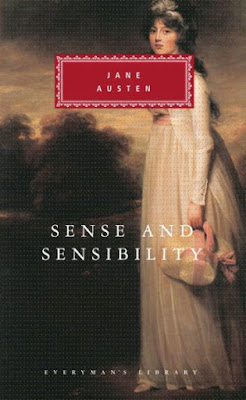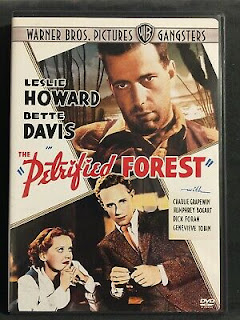Sense and Sensibility: by Jane Austen
I never liked book reports in school, and I never liked that generic classroom discussion about "what the author means by such and such." I think it's most important for people to be able to talk about art by way of how it strikes them personally, which can be anything. There's no right or wrong way to enjoy a piece, as long as you enjoy it for an interesting reason, or experience it an interesting way. That way you can validate the silent, unspoken opinions of others who may be experiencing it the same way but are too intimidated to discuss it out loud, wondering if it is valid for academic discussion. Anything that affects the way you experience it SHOULD be valid for academic discourse.
 I realized, maybe back it October of this year, that I'd never read a Jane Austen novel. Then I looked at the workload I'd carved out for myself, my "busy little schedule" as we all have, and said what we all say, "I'll get to it when I've got time, when my schedule lets up" and right then and there, I knew I had to head to the library and pick up a book that very same day, and take the next week or two off to just read and do nothing else.
I realized, maybe back it October of this year, that I'd never read a Jane Austen novel. Then I looked at the workload I'd carved out for myself, my "busy little schedule" as we all have, and said what we all say, "I'll get to it when I've got time, when my schedule lets up" and right then and there, I knew I had to head to the library and pick up a book that very same day, and take the next week or two off to just read and do nothing else.
I'm finding that one has to fight for a leisurely moment to do what is important in life. Reading a Jane Austen novel mattered to me, even if it wasn't going to advance my career, or get me out of debt, or make me popular, or look fashionable in front of anybody. So I just did it.
So there.
Fuck you, schedule. Maybe I'll get back to YOU when I have time for YOU.
"Hey, Royce, are you sure you can be reading leisurely right now? What about your schedule?"
"I don't have time for my schedule right now, I'm too busy with my life."
As I listened to her tell this story about this group of young ladies recently moved into a new house, all unmarried and interacting with the young bachelors nearby, I really gained an appreciation for the attitude and overall worldview of the storyteller, not just by way of the plot elements and the so called "characterization of the characters" but her use of language to not just give me a sense of time, place, and dramatic tension, but an individual perspective that this narrative is coming from. And I don't mean by way of the story being told in the first person, because it isn't.
I've always enjoyed literature as a means of storytelling unique in its own right because of how it's told by a speaker with their own charisma, their own worldview, and their own way of generating excitement and drama surrounding ideas and events, based on what compels them personally as an individual. I'm not just hearing a story, but I'm getting to see how someone else THINKS, and how they SEE the world around them. The best part is, I don't have to worry about whether I "agree" with any of this, I can just enjoy it for how it is different than my own, yet still compels me, like maybe I don't know everything after all, or maybe MY perspective is not THE perspective.
This is a scenario about marriage, relationships, formal courtship, and told from a female perspective. On paper, this is something I would expect to have me, as a male reader in the twenty-first century, rolling my eyes with its quaint-ness and cheesy story arcs, But Miss Austen (that's what I'm calling her now) really gave me an affirmation and validated me personally by reminding me what makes someone like her so special. Her use of language is not highly academic, or a stiff, rigid execution of a so called "winning formula" that is guaranteed to stimulate interest, (as nothing is guaranteed to stimulate interest) but an individual person with their OWN way of looking at the world.
That really is the ultimate thrill, and one that cannot be easily forged, copied, or faked. She believes in her own little type of magic that no one else can see, and puts it out into the world, hoping to get the rest of us as excited about it as she is. I've always cherished any person throughout history that gives me permission to do that; to believe in that little bit of magic that we all felt as children, that only you possess, and no one else can see, and to not let anyone "talk you out of it" or discourage you from it as you age into adulthood, where personal magic goes to die. If you fight for it, you really can keep it alive, and they will call you a "genius" or whatever.
 I realized, maybe back it October of this year, that I'd never read a Jane Austen novel. Then I looked at the workload I'd carved out for myself, my "busy little schedule" as we all have, and said what we all say, "I'll get to it when I've got time, when my schedule lets up" and right then and there, I knew I had to head to the library and pick up a book that very same day, and take the next week or two off to just read and do nothing else.
I realized, maybe back it October of this year, that I'd never read a Jane Austen novel. Then I looked at the workload I'd carved out for myself, my "busy little schedule" as we all have, and said what we all say, "I'll get to it when I've got time, when my schedule lets up" and right then and there, I knew I had to head to the library and pick up a book that very same day, and take the next week or two off to just read and do nothing else.I'm finding that one has to fight for a leisurely moment to do what is important in life. Reading a Jane Austen novel mattered to me, even if it wasn't going to advance my career, or get me out of debt, or make me popular, or look fashionable in front of anybody. So I just did it.
So there.
Fuck you, schedule. Maybe I'll get back to YOU when I have time for YOU.
"Hey, Royce, are you sure you can be reading leisurely right now? What about your schedule?"
"I don't have time for my schedule right now, I'm too busy with my life."
As I listened to her tell this story about this group of young ladies recently moved into a new house, all unmarried and interacting with the young bachelors nearby, I really gained an appreciation for the attitude and overall worldview of the storyteller, not just by way of the plot elements and the so called "characterization of the characters" but her use of language to not just give me a sense of time, place, and dramatic tension, but an individual perspective that this narrative is coming from. And I don't mean by way of the story being told in the first person, because it isn't.
I've always enjoyed literature as a means of storytelling unique in its own right because of how it's told by a speaker with their own charisma, their own worldview, and their own way of generating excitement and drama surrounding ideas and events, based on what compels them personally as an individual. I'm not just hearing a story, but I'm getting to see how someone else THINKS, and how they SEE the world around them. The best part is, I don't have to worry about whether I "agree" with any of this, I can just enjoy it for how it is different than my own, yet still compels me, like maybe I don't know everything after all, or maybe MY perspective is not THE perspective.
This is a scenario about marriage, relationships, formal courtship, and told from a female perspective. On paper, this is something I would expect to have me, as a male reader in the twenty-first century, rolling my eyes with its quaint-ness and cheesy story arcs, But Miss Austen (that's what I'm calling her now) really gave me an affirmation and validated me personally by reminding me what makes someone like her so special. Her use of language is not highly academic, or a stiff, rigid execution of a so called "winning formula" that is guaranteed to stimulate interest, (as nothing is guaranteed to stimulate interest) but an individual person with their OWN way of looking at the world.
That really is the ultimate thrill, and one that cannot be easily forged, copied, or faked. She believes in her own little type of magic that no one else can see, and puts it out into the world, hoping to get the rest of us as excited about it as she is. I've always cherished any person throughout history that gives me permission to do that; to believe in that little bit of magic that we all felt as children, that only you possess, and no one else can see, and to not let anyone "talk you out of it" or discourage you from it as you age into adulthood, where personal magic goes to die. If you fight for it, you really can keep it alive, and they will call you a "genius" or whatever.


